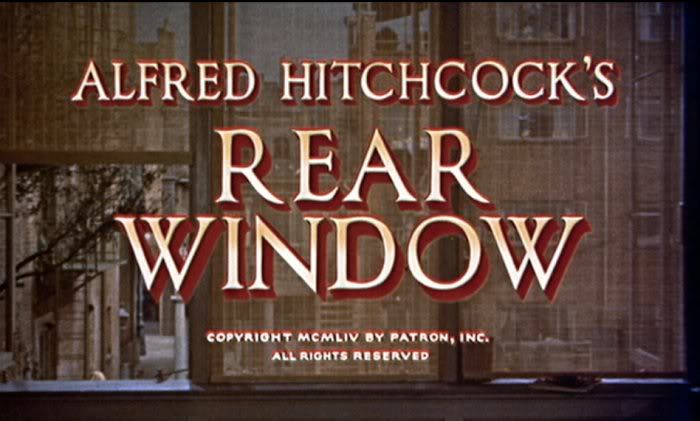
I watched this movie in portions over three days -- not the ideal way to watch a film, I admit, but it's not my first time through -- and my experience revisiting Rear Window was actually a lot like my experience revisiting Fight Club: it was weird to see how much of an impact this one film has had on the kind of repeated themes and events that occur in my own work. Somewhere between this and Don Quixote lies a certain kind of story I keep revisiting. I have my theories as to why, but this isn't about navel-gazing. It's supposed to be about my thoughts on watching a movie.
This film falls right on the cusp between what I love about Hitchcock and what I hate about him. It's got a lot of really stagy, obviously artificial setups, dialogue, sets and action scenes, but it also uses most or all of that to tell a story that is singularly Hitchcockian (I'm sure I didn't just make that word up), a novel exploration of suspense and tension, a slightly askew and cheeky morality story, and a bracing headlong dive into relatively uncharted psychological territory. Keeping all of the action across the way and through a window works, it implicates us in our desire to poke into others' lives, and it makes us all the more tense when things do (finally) happen across the way. A key element was Jeff's helplessness throughout: first his inability to convince anybody that mattered that Thorwald may be up to something, then his helplessness as he watched Thorwald move on Lisa, and especially the terror of his immobility when Thorwald turned the tables and came after him. That helplessness is a main ingredient in what makes the movie scary, tense. (Helplessness is a theme I'm exploring, so it's at the forefront of my attention lately.)
But on the other side of the coin, Hitchcock is at his worst when he tries to delve into common human dramas, characterization, relationships. Like Vertigo, like the opening of Psycho, like much of North by Northwest, whenever we have to sit with two characters flirting or two lovers arguing the notes ring a little false, a little bit looking-down-his-nose at the foolish plebes of his stories. (I know he doesn't write them, but the detached stiffness of each film rings similarly false, from writer to writer; I mean, it's hardly a bold claim to suggest that Hitch cares deeply about suspense, tension, and plot and not much at all for character, relationships, or ordinary human drama.) Rear Window slacks for a good chunk of it, especially as poor Jimmy Stewart has nothing to do but sit in a chair, fidget with a camera lens or a pair of binoculars, and twitch back back and forth between the window and the lamp. An inordinate amount of time is spent on tangential issues like whether or not silver-spoon Lisa is suited to traipsing about the globe with rogue-wanderer Jeff. I like that she proves infinitely more tenacious and resilient than he gives her credit for (this may be one of Hitch's most feminist characters), but I'm not sure the issue feels adequately resolved at the end for me, and I'm less sure that it matters ultimately to the story beyond giving Lisa motivation deeper than just echoing Jeff's intense curiosity for some of the bolder actions she takes. Proving something to her man is certainly adequate motivation, but the number of scenes it took to establish this felt a touch exhausting. At least in Vertigo, all the time spent on the strange relationships with women are directly linked to the themes of the story; they may feel dry and phony but it makes sense for them to feel repetitive in a story about obsession. Here, it just felt like constant reminders that Jeff's normally a take-action fearless kind of guy, and that Lisa is expected (by Jeff) to be a pretty princess and cosmopolitan socialite, above getting her hands dirty. All of that could be handled with a lot less.
Whenever I watch a Hitchcock movie, I always praise his sense of story and structure, and how he knows his way around a setpiece, but I also always come away griping that he spins plates too long, has no sense of pacing in his dialogue or character-building moments, and loses a lot of (or all) his well-built steam and well-earned excitement. Well, what can I tell you? This is no exception. It's a really, really good movie, except for the parts that aren't.

No comments:
Post a Comment